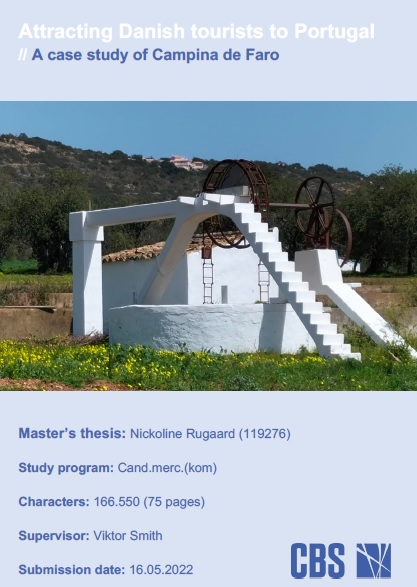|
Digital meets Culture https://www.digitalmeetsculture.net/article/incultum-master-thesis-denmark-and-portugal/ Export date: Tue Mar 3 7:00:52 2026 / +0000 GMT |
INCULTUM master thesis between Denmark and Portugaltext by Viktor Smith, Copenhagen Business School Following a call for master thesis in summer 2022, partner CBS Copenhagen Business School is supervising students interested in cultural tourism, including the work done with the H2020 project INCULTUM. One of the thesis was specifically focused on the INCULTUM Pilot set in Portugal, with title "Attracting Danish tourists to Portugal: A case study of Campina de Faro" by Nickoline Rugaard. >>> Access the thesis (PDF, 5 Mb)  In dialogue with the work of the Portuguese Pilot coordinated at the university of Algarve, investigations have been carried out by the INCULTUM team at Copenhagen Business School with a special focus on Danish visitors to Algarve and their image (or lack of such) of the Campina de Faro. More than 100.000 Danish tourists visit Algarve coast every year (apart from a temporal decline during the pandemic) which yields it the third-largest destination in Portugal after Madeira and Lisbon. However, an exploratory survey among 117 recent Danish visitors to Portugal carried out as part of the Master thesis project (among which 34% had visited Algarve) showed that only 5 persons (4%) had heard the name ‘Campina de Faro' and only 3 had actually been there. Moreover, when the respondents at large were asked what they would imagine ‘Campina de Faro' to be, 59% said they had had no idea at all while the rest expected it to be some facility or place in or near Faro – predominantly a camping site (17 respondents) or, alternatively, a lighthouse, an airport, etc. Taking further these and other findings gained through two online surveys and a series of qualitative interviews, the thesis analyzes the challenges of crystallizing a more salient and adequate place-brand image among potential ´visitors from Denmark while at the same time aligning it with a brand identity desirable to the local communities. Current follow-up research takes the topic further and specifically considers the potential of participatory bottom-up approaches to the naming and framing a marginal tourism destination close to a major tourism hub, as illustrated by Campina de Faro. The emphasis in on the so-called low-budget route of (place-)brand development which assigns a major role to what people actually see and do when exposed to the location and/or its name, and how the local inhabitants may actively contribute to the image/identity-building process in word and in deed, including also testimonies of older residents. |